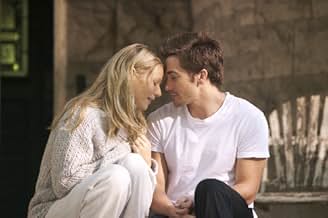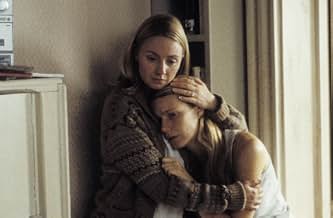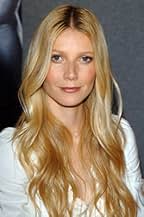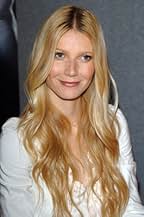Adicionar um enredo no seu idiomaThe daughter of a brilliant but mentally disturbed mathematician, recently deceased, tries to come to grips with her possible inheritance: his insanity. Complicating matters are one of her f... Ler tudoThe daughter of a brilliant but mentally disturbed mathematician, recently deceased, tries to come to grips with her possible inheritance: his insanity. Complicating matters are one of her father's ex-students, who wants to search through his papers, and her estranged sister, who... Ler tudoThe daughter of a brilliant but mentally disturbed mathematician, recently deceased, tries to come to grips with her possible inheritance: his insanity. Complicating matters are one of her father's ex-students, who wants to search through his papers, and her estranged sister, who shows up to help settle his affairs.
- Direção
- Roteiristas
- Artistas
- Prêmios
- 4 vitórias e 6 indicações no total
- Limo Driver
- (as Tobiacz Daszkiewicz)
- University Friend
- (as C Gerod Harris)
- American Student
- (não creditado)
- Wake Guest
- (não creditado)
Avaliações em destaque
This is story about mathematics, actually about mathematicians which is much, much better. "Beautiful Mind" was repellent in a few ways; one was in the cartoonish way mathematical imagination was shown. Another was the way history was bent away from a truly interesting story to be palatable for film audiences. Math at that level requires the juice of life that he took in large gulps from both sexes. And he was such a glutton for mindbending adventure that he bent his own mind. I do not believe he suffered from some genetic disease, nor did he.
This movie repairs some of that. Its clear I think that the Nash phenomenon is at work here: minds powerful enough to break themselves, possibly leaving some mathematical residue, possibly not. The focus on primes may be accidental, but it is apt. As time goes on, they become increasing rarer and infinitely more fascinating, all apparently random but with some hint of unseen order. They don't interest me so much...
In fact, selecting films to build into your life (perspectives and stories to live) is a lot like choosing the types of problems to work on and how. The proof of being in a way is that the selection is made deliberately, based on your weaknesses, not your strengths. Only weak mathematicians and souls work on problems they understand. No life comes from the undaunting. No magic ever comes alone or from peace.
Hopkins isn't obnoxious here. Its clear that he is acting and that the lines are those of a stage character. But he doesn't grandstand; he's gently broken and there are some sweet moments (only two, but central) where he seems to completely have second-guessed where his daughter is going and lucidly makes key suggestions. Hopkins understood those moments and gives then some significance.
Ted's Evaluation -- 3 of 3: Worth watching.
I didn't see the David Auburn play on which the movie is based, and maybe many of the film's detractors have: screen adaptations of favorite plays often seem to dilute them to the detriment of the story. But if this movie is worse than its stage counterpart, it must have made one damn fine play.
The acting in this film is its major attribute, and director John Madden is wise enough to realize the talent of his ensemble and stand out of their way. He plays a bit with chronology and lets the pieces of his story click into place much like a math puzzle; I don't know whether or not this is original to the film or borrowed from the play, but either way it works well. But mostly, he lets the actors strut their stuff, and the four principals make the most of meaty roles.
Most of the acclaim has been falling, and rightly so, to Gwyneth Paltrow, who gives a full-bodied, textured and powerful performance as Catherine, who has inherited her genius at math from her father and is deathly afraid that she may have inherited his madness as well. I don't know that Paltrow has yet had a role as substantial as this one, and she flexes her acting chops in a way I have not seen her do outside of her underrated performance in "Sylvia." Hope Davis matches her scene for scene as the astringent older sister; it's refreshing to see Davis break away from the mousy, mealy persona she so frequently adopts and play this crisp, overwhelming character. The male actors have less to do overall, but the roles are perfectly cast. Jake Gyllenhaal is ripe for stardom, and this may be the year that brings it. Anthony Hopkins has been dismissed as hammy here, but I think he does an effective job of portraying mental illness, and creates heartbreaking moments that could have been ruined had they been played differently.
"Proof" feels entirely honest about the dynamics of dysfunctional families; you just know David Auburn is writing from personal experience. Like Robert Redford's "Ordinary People," if you have any exposure to similar family dynamics, you know the team that put the film together got everything just right. "Proof" also creates a parallel between mathematics and the messiness of life that makes one re-evaluate the rigidity of what always appears to be an exact science. As one must accept a level of ambiguity in life, one must also be willing to make leaps of faith in mathematics, because nothing can be 100% proved.
I highly recommend this film. It's satisfying on both an intellectual and emotional level. And any movie that can make math exciting to me gets an automatic thumbs up.
Grade: A
In the end, this film is all about Gwyneth Paltrow.
She is on screen at least 80% of this film. Her character dances between mourning, anger, remorse, confusion, fear, vulnerability, sadness, and just a little bit of love. There are very dramatic changes in emotion from moment to moment, and Paltrow pulls it off brilliantly.
Sir Anthony Hopkins role, while relatively small, is crucial to the film. His performance was good, but not great. But it didn't really matter, as Proof is all about Paltrow. Hope Davis and Jake Gyllenhaal also gave solid performances, but their as with Hopkin's role were really nothing more than support Paltrow.
The biggest disappointment for me was the almost total lack of any 'real' mathematics. For a film that revolves around brilliant mathematical proofs, there's an almost painful scarcity of and real math in the film. There are shots of seemingly random equations scrawled across paper or a blackboard, and the odd conversation making reference to some known mathematical law or theorem, but I would have liked more.
IF you want a happy film, go see something else. If you want a mindless film, go see something else. If you want a typical love story, go see something else. If you want an intelligent well written and presented story of substance involving a a character experiencing a roller-coaster of emotions, Proof may be for you.
The flashbacks cut effectively back and forth and smooth out where each character is coming from.
"Catherine," the daughter of a brilliant mathematician who is somewhat modeled on John Nash's struggles with madness which were portrayed in "A Beautiful Mind," is still the focal point of attention. But with the other characters fleshed out more Gwyneth Paltrow has more to naturalistically react to than the stage actresses (I saw it on Broadway with a mercurial Anne Heche). Paltrow brings unexpected fragility to the role and makes her sarcastic accusations to her sister come out of personal pain and not just spitefulness. You really see that she is emotionally ravaged from putting her life and mind on hold for a father with a very strong personality.
Anthony Hopkins is unusually paternal as the father and you understand her attractions and fear of him, as well as why the sister had to flee how insecure she felt there, as Hope Davis manages to breathe some life into a strident character. We see very clearly the demands of being a caregiver to a legend. Unlike in "Iris" at the end of careers, we do ache at the sacrifices the young caregiver has made and how this claustrophobic existence has led to her own crippling doubts about her work, her life and her sanity.
Jake Gyllenhaal is the hunkiest, most adorable, rock 'n' rollin' math graduate student since Matt Damon in "Good Will Hunting" and could help increase math enrollments around the country. But as irresistible as he is, and their relationship is literally more believably fleshed out as young people than in the play, we also can share Paltrow's suspicion of him. But we see more of his activities, as the film opens up the play, so we too clearly know before she that he has regained in our credibility as he seeks his proof. I don't mind that the film adds to the romantic aspects and drawn out coda as I thought the play tempted unfulfillingly in that direction and it is a means to help her regain the multiple meanings of proof -- as evidence, as trust, as confidence.
Director John Madden keeps the camera moving actively during long dialog interchanges, reflecting "Catherine"s agitated state of mind. The house and academic setting well establish the atmosphere, particularly when there's more people around, though some of the outdoor shots seemed like filler.
The score is occasionally intrusive, but the concluding voice-over is even more annoying and unnecessary.
Você sabia?
- CuriosidadesAccording to the clues of Hal, played by Jake Gyllenhaal, the proof can be the proof of Riemann hypothesis. He says "a very important proof, of a mathematical theorem about prime numbers, which mathematicians are trying to prove; it's historic; you can publish it, give press conferences; all newspapers in the world will talk to the person who have found it." It's one of the Millennium Problems.
- Erros de gravaçãoThe daughter talks about how the father was looking for a message from aliens in the Dewey decimal call numbers on the books from the University of Chicago library. The University of Chicago uses Library of Congress call numbers, which begin with letters, not numbers.
- Citações
Catherine: [Reading Robert's Notebook] "Let X equal the quantity of all quantities of X. Let X equal the cold. It is cold in December. The months of cold equal November through February. There are four months of cold, and four of heat, leaving four months of indeterminate temperature. In February it snows. In March the Lake is a lake of ice. In September the students come back and the bookstores are full. Let X equal the month of full bookstores. The number of books approaches infinity as the number of months of cold approaches four. I will never be as cold now as I will in the future. The future of cold is infinite. The future of heat is the future of cold. The bookstores are infinite and so are never full except in September..."
- ConexõesFeatured in The 63rd Annual Golden Globe Awards 2006 (2006)
- Trilhas sonorasEl chocha loca
(2002)
Written by Claudio Quattrocchi
Performed by Loca
Published by Big Tiger Music (BMI)
Courtesy of Lovecat Records
By Arrangement with Ocean Park Music Group
Principais escolhas
- How long is Proof?Fornecido pela Alexa
Detalhes
- Data de lançamento
- País de origem
- Central de atendimento oficial
- Idioma
- Também conhecido como
- Proof
- Locações de filme
- Empresas de produção
- Consulte mais créditos da empresa na IMDbPro
Bilheteria
- Orçamento
- US$ 20.000.000 (estimativa)
- Faturamento bruto nos EUA e Canadá
- US$ 7.535.331
- Fim de semana de estreia nos EUA e Canadá
- US$ 193.840
- 18 de set. de 2005
- Faturamento bruto mundial
- US$ 14.189.860
- Tempo de duração
- 1 h 40 min(100 min)
- Cor
- Mixagem de som
- Proporção
- 2.35 : 1





































